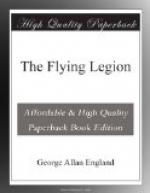With great astuteness the Master had the wireless put in shape, at once, and sent out three messages at random, on two successive days. These messages stated that Nissr had been sighted in flames and falling, in North latitude 19 deg., 35’; longitude 28 deg., 16’, or about two hundred and fifty miles north-west of the Cape Verdes; that wreckage from her had been observed somewhat south of that point; and that bodies floating in vacuum-belts had been recovered by a Spanish torpedo-boat.
No answer came in from any of these messages; but there was always an excellent chance that such misinformation would drag a red herring across the trail of pursuit.
Men never slaved as the Legionaries did, especially toward the end. The last forty-eight hours, the Master instituted night work. The men paused hardly long enough to eat or sleep, but snatched a bite when they could, labored till they could do no more, and then dropped in their places and were dragged out of the way so that others could take hold. Some fell asleep with tools in hand, stricken down as if by apoplexy.
The Master had wisely kept the pace moderate, at first, but had speeded up toward the end. None grew more haggard, toil-worn, or emaciated than he. With blistered hands, sweat-blinded eyes, parched mouths and fevered souls these men fought against all the odds of destiny. Half naked they strove, oppressed by heat, sun, flies, thirst, exhaustion. Tobacco was their only stay and solace. The Master, however, only chewed khat leaves; and as for “Captain Alden,” she toiled with no stimulant.
It was 7:33, on the morning of the sixth day, that Frazier—now chief engineer—came to the Master, as he was working over some complex bit of mechanism in his cabin. Frazier saluted and made announcement:
“I think we can make a try for it now, sir.” Frazier looked white and wan, shaking, hollow-eyed, but a smile was on his lips. “Two engines are intact. Two will run half-speed or a little better, and one will do a little.”
“One remains dead?”
“Yes, sir. But we can repair that on the way. Rudders and propellers will do. Helicopters O.K.”
“And floats?”
“Both aft floats repaired, sir. One is cut down a third, and one a half, but they will serve.”
“How about petrol?” the Master demanded. “We have only that one aft starboard tank, now, not over three-quarters full.”
“There’s a chance that will do till we can run down a caravan along the Red Sea, carrying petrol to Suakin or Port Sudan. So there’s a fighting hope—if we can raise ourselves out of this sand that clings like the devil himself. It’s lucky, sir, we jettisoned those stores. Wind and current brought some of them back, anyhow. If they’d stayed in the storeroom they’d have all been burned to a crisp.”
“Yes, yes. You think, then, we can make a start?” The Master put his apparatus into the desk-drawer and carefully locked it. He stood up and tightened his belt a notch.




